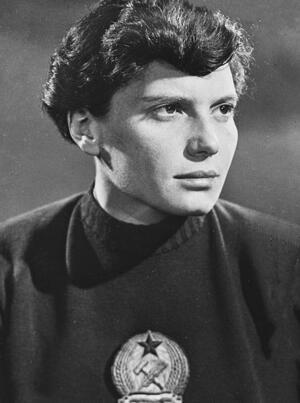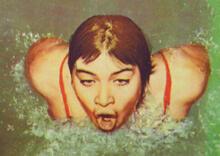Eva Szekely
Olympic medalist swimmer Éva Székely, 23 October 1956
Photo from the Nationaal Archief. Wikimedia Commons.
Born in Budapest, Eva Szekely began swimming as a child but was forced to stop formal training during the Nazi occupation of Hungary. However, she returned to swimming after the war and went on to win thirty-two national individual swimming titles and eleven national team titles. At the 1952 Olympic Games in Helsinki, she set a new Olympic record in the 200-meter breaststroke. She and her husband defected in 1957 and moved in the United States but returned to Hungary shortly thereafter. In her later life she remained outspoken about her Jewish identity, trained her daughter, who would go on to become an Olympian herself, and published a short story.
Article
Olympic medalist Eva Szekely was born on April 3, 1927, in Budapest, Hungary. As a child she belonged to a local swim team. In 1941, at the age of fourteen, she was expelled from the team because she was Jewish. During the last part of World War II, she lived in a crowded two-room “safe-house” in Budapest run by the Swiss. To keep in shape, every morning Szekely ran up and down five flights of stairs one hundred times. At the end of the war, she began to compete in international sport events. At one of these she met her future husband, Deszo Gyarmati (b. 1927), a water polo player and five-time Olympic medalist. In 1954 she gave birth to a daughter, Andrea (Gyarmati), who also became an Olympic medalist swimmer.
Between 1946 and 1954 Eva Szekely won thirty-two national individual swimming titles and eleven national team titles. In 1947 she won three gold medals at the World University Games and finished second in the 200-meter breaststroke at the European Championship. At the 1948 Olympic Games in London, she placed fourth in the 200-meter breaststroke, fifth in the 4x100-meter freestyle and sixth in the 400-meter freestyle. At the 1951 World University Championship she won five gold medals. At the 1952 Olympic Games in Helsinki, she won the gold medal in the 200-meter breaststroke, setting a new Olympic record.
Eva and her husband left for the 1956 Olympic Games in Melbourne a few days after the outbreak of the Hungarian revolt against Communism. Upon arrival in Melbourne, they were informed that the Russians had come to power. With no word about her young daughter or her parents, she spent a hard week of anxiety before her events and lost more than twelve pounds. Nevertheless, she managed to win a silver medal in the 200-meter breaststroke and finished fifth in the 400-meter freestyle.
In February 1957 the Szekelys were able to visit Vienna, where they promptly defected and flew to the United States. They returned to Budapest the next year because they were worried about Eva’s parents, who had remained in Hungary. Upon their return to Hungary Eva retired from competitive swimming and began to train young swimmers, also coaching her daughter in preparation for a career as a competitive swimmer.
While few, if any, active or retired Hungarian Jewish athletes were open about their religious identity, Szekely had the courage and determination to go public with her Jewishness. During a nationally televised interview in 1974 she spoke of the anti-Jewish laws of the early 1940s which limited participation in athletic competition. Referring to those who could document non-Jewish origin as far back as their grandparents, she noted, “That was no problem for me, I did not have to go back as far as my grandparents. Unequivocally, I was a Jew.”
Since ending her swimming career, Szekely—who was a pharmacist by profession—published literary works. Her first literary venture was a short story entitled “The True, Great Love of My Life in Water.” The story was published in the 1977–1978 yearbook of the Jewish community, a renowned repository of scholarly articles and works of fiction.
Szekely was elected to the International Jewish Sports Hall of Fame and was made a member of the International Swimming Hall of Fame in 1976.
Eva Szekely died on February 29, 2020.
Szekely, Eva. “Because I Wanted to Be An Olympic Champion.” In Young People Speak: Surviving the Holocaust in Hungary, edited by Andrew Handler and Susan V. Meschel, 41-49. Franklin Watts, 1993.
Available online through The United States Holocaust Memorial Museum via the Internet Archive.
Witchurangsri, Ratchakarn. "Modelling and Forecasting Olympic Winners Performances in Swimming, Running, Jumping and Throwing Events." PhD diss., Prince of Songkla University, Pattani Campus, 2001.




